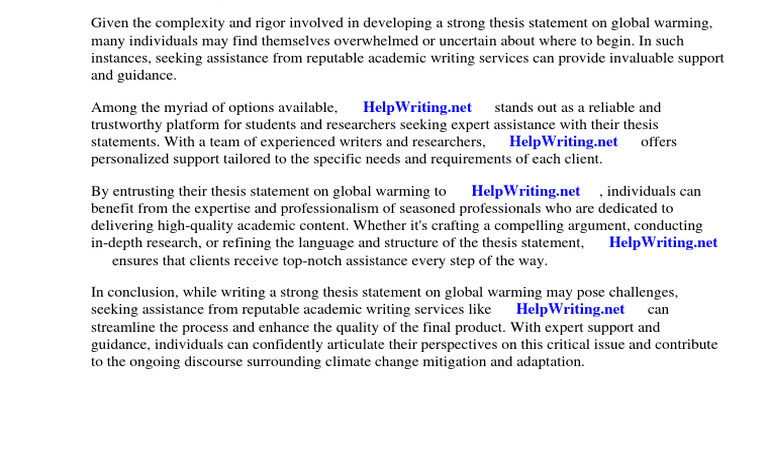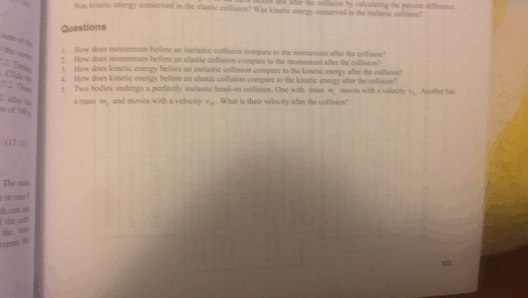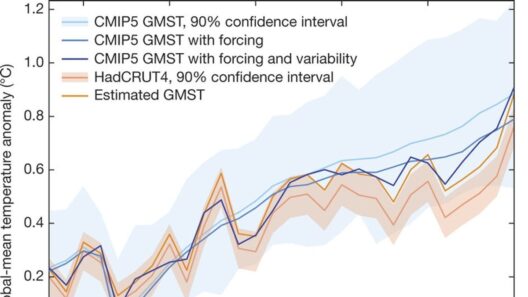The climate crisis has burgeoned into one of the most formidable challenges of our era, demanding immediate attention and robust action. Understanding this issue through the lens of a strong thesis statement allows for a more profound engagement with the complexities surrounding global warming. A well-crafted thesis can serve as a compass, guiding discourse, research, and policy formulation. Consequently, it becomes imperative to elucidate the mechanisms of framing the climate crisis by positing a compelling thesis statement.
At the heart of the matter lies an essential question: How can we articulate the nuances of global warming in a manner that not only encapsulates its multifaceted nature but also galvanizes society towards veritable change? To explore this, one must dissect the layers of global warming, recognizing both its scientific underpinnings and its socio-economic ramifications.
A strong thesis statement on global warming should endeavor to reflect a synthesis of scientific data, ethical considerations, and transformative actions. For instance, consider the thesis: “Global warming, driven by anthropogenic carbon emissions, not only threatens biodiversity but also poses existential risks to human civilization, necessitating immediate and systemic changes in energy consumption, policy reform, and societal attitudes toward sustainability.” This encapsulation draws attention to the interconnectedness of ecological and human systems, thereby piquing curiosity about the broader implications of climate change.
Firstly, the scientific basis of global warming is irrefutable. The consensus among climatologists underscores the critical link between human activity and rising global temperatures. The burning of fossil fuels, deforestation, and industrial processes release copious amounts of greenhouse gases into the atmosphere. This leads to the greenhouse effect, where certain gases trap heat, resulting in climate anomalies, ocean acidification, and melting polar ice caps. A compelling thesis incorporates these scientific elements, compelling readers to acknowledge the gravity of the situation.
Moreover, the ethical dimension of global warming cannot be overlooked. The ramifications are not solely environmental; they encroach upon realms of social justice, economic equity, and human rights. Vulnerable populations—those least responsible for carbon emissions—disproportionately bear the brunt of climate change. This ethical framing in a thesis statement invites discourse on responsibility and equity, prompting society to confront its moral obligations towards impacted communities. The intricate dance of cause and effect presents a compelling narrative that demands our attention.
Transitioning from the scientific and ethical to the pragmatic, the thesis statement should advocate for systemic changes. The need for an energy revolution has never been more pressing. Renewable energy sources—wind, solar, and hydroelectric—offer viable alternatives to fossil fuels. Advocating for a shift not only highlights technological possibilities but also ignites curiosity about innovation in the energy sector. A strong thesis encompasses a call to action, encouraging exploration into policies promoting sustainable practices and the decarbonization of economies. This framing positions global warming as not just a fearsome threat but also a gateway to transformative potential.
Additionally, understanding the role of individual and collective action is critical. The thesis statement must extend beyond institutional reforms to encapsulate the responsibility of each person. Simple lifestyle adjustments—reducing waste, conserving energy, choosing sustainable transport—aggregate into substantial impacts when embraced by the masses. This participatory angle can elicit a sense of agency, showcasing climate activism as both a personal commitment and a broader movement—thus piquing the curiosity of readers about their power to effect change.
The role of education in this landscape also emerges as pivotal. A robust thesis should advocate for educational curricula that prioritize climate literacy. When future generations are equipped with the knowledge and tools to combat environmental degradation, the prospects for meaningful change magnify. This educational perspective enhances curiosity not only about climate science but also about the political mechanisms essential for enacting change.
Consideration of the economic ramifications of the climate crisis must also feature prominently in a strong thesis statement. The transition to a sustainable economy presents both challenges and opportunities. Industries reliant on fossil fuels face disruption, yet this upheaval paves the way for green technologies and job creation in renewable sectors. Positing a thesis that includes economic transformation challenges readers to reconsider traditional economic paradigms and consider the potential for regeneration within a sustainable framework, drawing them into a conversation about the future of work and prosperity.
Finally, collaboration and international accords, such as the Paris Agreement, are pivotal threads in the tapestry of modern climate discourse. A strong thesis should encapsulate the need for global unity in tackling global warming, highlighting the interdependence of nations in an increasingly interconnected world. This aspect can elicit curiosity about political relationships and the dynamics that facilitate or hinder collaborative efforts. A global approaching, framed within the thesis, inspires readers to contemplate the possibilities of cohesion in addressing one of humanity’s most significant predicaments.
In summary, a strong thesis statement on global warming is not merely a collection of assertions; it is an invitation to engage with an issue of monumental importance. By framing the climate crisis through scientific data, ethical considerations, and actionable solutions, the thesis acts as a beacon, guiding individuals and societies toward the essential transformation needed to combat this existential threat. It propels curious minds into action—a rippling effect that can potentially lead to monumental change. In a world facing an imminent climactic shift, the urgency for framed discourse on global warming is undeniable. The challenge lies not just in acknowledging the crisis but also in harnessing the collective will to address it decisively.






